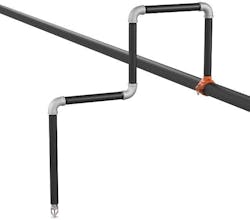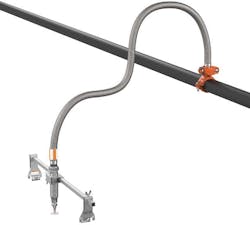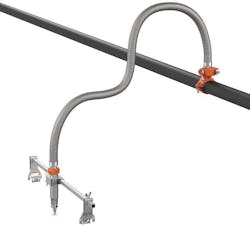Fire Protection Considerations for Tenant Improvement Projects
It's common for a commercial tenant to move into a new space and initiate leasehold improvements to make it their own. They might add or remove walls, change ceiling heights, and upgrade or install new electrical, plumbing, and HVAC systems.
As exciting as it may be for business owners to watch their storefront vision become reality, it’s critical they understand that any physical change can impact the existing fire protection system’s effectiveness and code compliance. For example, a wall addition or new sign may obstruct a sprinkler from providing adequate spray coverage, thereby violating NFPA 13 Standard.
To ensure occupants, inventory, and property are adequately protected if a fire occurs, tenants must have the sprinkler system evaluated and potentially modified before their space opens for business. This can be as simple as removing a sign obstructing a sprinkler or as intricate as reconfiguring the entire sprinkler system layout.
Understanding how space modifications may impact sprinkler systems can help new tenants avoid unexpected construction costs and delays.
How Do Different Sprinkler System Designs and Technology Impact Construction Projects?
Fire sprinkler systems can be constructed using different pipe-joining techniques and technologies, each with their own considerations regarding moving sprinklers to meet fire codes and standards.
Distribution pipe
Distribution lines are most often built using either threaded pipe systems, which are assembled with threaded pipe ends, or grooved systems, which use couplings and fittings to mechanically join grooved pipe ends. Many older buildings—the average commercial building is about 50 years old—have threaded pipe fire protection systems, but a growing number of system designers have adopted grooved systems in newer buildings and retrofits.
Generally, threaded systems are more labor-intensive to modify than grooved systems because of the screwing mechanisms required to disassemble and reassemble, and the additional preparation time (taping and doping) needed to install threaded pipes. Contractors can disassemble grooved joints in seconds by loosening bolts on the coupling and reuse the materials without additional pipe end preparation work.
Sprinkler connections
The sprinkler connections offer significant opportunities to maximize time and cost savings when moving sprinklers or reconfiguring systems. Whether the main distribution line is grooved or threaded, contractors must ensure adequate water pressure and flow to the new sprinkler location. They must calculate how much friction loss a system experiences for each pipe length, joining component and directional bend. Hydraulic recalculations look different depending on the products and solutions used:
Hard pipe and fittings
Moving a sprinkler in a completely hard piped system often requires additional planning and coordination, as contractors will need to cut and add fittings and pipe to relocate sprinklers. In these cases, system designers need to calculate friction loss for each foot of pipe and fitting added to the existing distribution line during the reconfiguration. Any adjustments made later in the project could further complicate the calculations and extend installation times.
Flexible hoses
Flexible hoses simplify the hard pipe design and installation process by eliminating extra pipe lengths and fittings and the need for precision layouts to route around obstructions and get sprinklers into their correct ceiling position. The flexible hose is connected to the branch line and bent as needed to fit the sprinkler into a new location. System designers calculate friction loss at the branch line outlet and hose, instead of at each new joint.
Flexible sprinklers
Flexible sprinklers incorporate the flexible hose and sprinkler into a single unit that accounts for pressure and flow loss. In addition to offering contractors the same speed and ease of installation benefits as flexible hoses, system designers only need to calculate friction loss at the branch line outlet with this technology. Unless pipe is added or removed during the reconfiguration process, hydraulic recalculations are often unnecessary in retrofit projects using flexible sprinkler technology.
Improving Budget Forecasting and Planning for Fire Protection Projects
Tenant improvements are crucial in curating a space that reflects a business’s brand and story. Life safety will always come first, but getting a newly leased space up to code doesn’t have to break the bank. By understanding the construction process and technologies available to them, business owners can make the best decision for their bottom line and, more importantly, the safety of their customers.
Before signing a lease agreement, tenants can better understand how their construction project and budget may shape up by asking questions about the pipe-joining method used in the building’s distribution lines and the existing system’s sprinkler technology. From there, they can evaluate whether investing in technologies like flexible sprinklers is worthwhile to expedite and simplify construction schedules. If the technology is already present, they can adjust their budget estimates accordingly to reflect potentially lower construction costs.
About the Author
Alaina Schwall
Alaina Schwall is a Fire Protection Product Manager at Victaulic, a leading global provider of mechanical pipe-joining, flow control, and fire protection solutions. Alaina holds a bachelor’s degree in aerospace engineering from Purdue University and Level 1 NICET certifications in Water-Based Systems Layout and Inspection and Testing of Water-Based Systems. Contact her on LinkedIn and learn more at www.victaulic.com.



